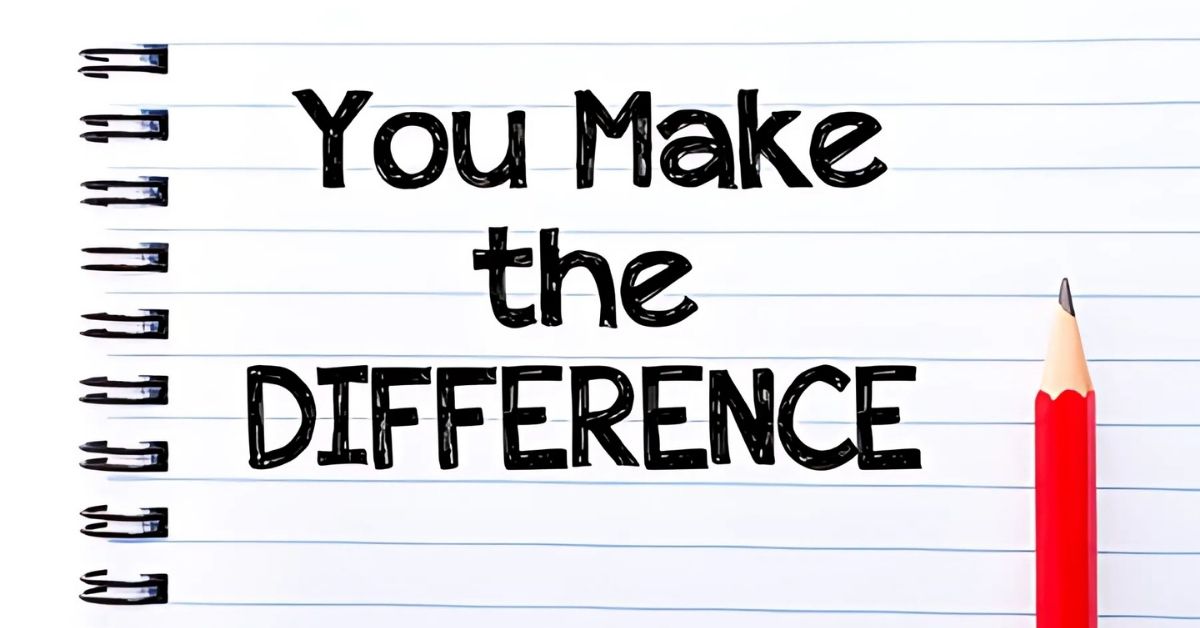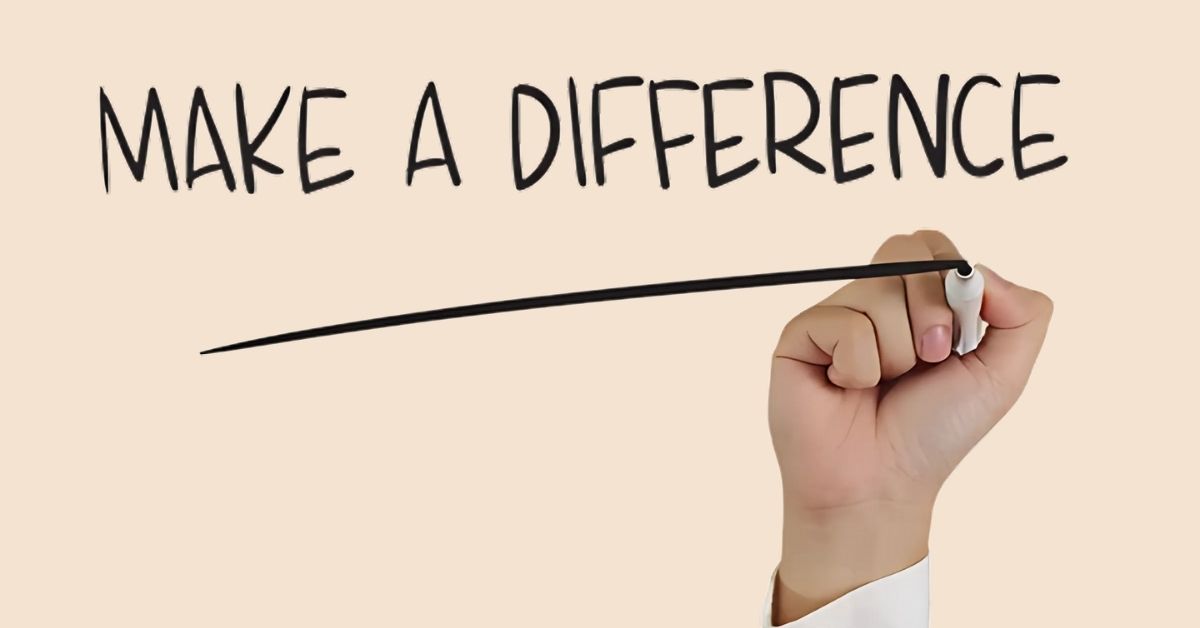Saying the same thing over and over can get boring. That’s why it helps to know other ways to say make a difference. Using fresh words makes your message clearer and stronger. It also helps people feel what you’re saying. When you want to show impact or change, your words matter a lot.
In this article, you’ll learn 14 smart and simple ways to say make a difference. These phrases are easy to use in writing, speaking, or casual talk. They all carry the same deep meaning. Whether at work or in life, knowing how to say make a difference in new ways helps you sound more natural and powerful.
1. What Does Make a Difference” Mean?
The phrase “make a difference” means to have an impact, to influence a situation, or to cause a change that matters. It’s often used to describe acts of kindness, leadership, or innovation that leave a lasting mark. For example, a teacher can make a difference by encouraging a struggling student. A volunteer might change lives through one small act of kindness. The power of the phrase lies in its ability to show significance, importance, and meaning in actions, even when they seem small.
In American culture, this phrase is used across many areas from education and health care to business and politics. It reflects values like gratitude, empathy, and support. According to Merriam-Webster, to “make a difference” means “to cause a change” or “to be important in some way.” It carries an emotional tone and a sense of responsibility. People use it in both formal and casual settings to express appreciation, encouragement, and acknowledgment. You might hear someone say, “You really made a difference in my life,” and that’s more than a compliment, it’s a recognition of impact and gratitude that touches the heart.
also reaide: 15 Other Ways to Say “Positive Impact”
2. Other Ways to Say “Make a Difference”

Sometimes, repeating the same phrase feels stale or doesn’t fit the tone you want. That’s where synonyms, rewording, and other contextual variations come in. There are many creative and semantic alternatives that help express the same meaning while keeping your language natural and more engaging. Whether you’re writing a speech, a thank-you email, or an article, these phrases help shift the emotional tone, add personality, and sound more human. According to resources like PowerThesaurus, thesaurus.com, and Quillbot, there are dozens of lexical substitutions that reflect the effect, weight, or feeling behind your words.
These 14 expressions we’re about to explore below do exactly that. They are more than just substitutes they’re tools to convey emotion, action, and recognition. Some are bold and energizing. Others are subtle and full of sincerity. The key is to pick one that matches your message, your audience, and your intention.
also reaide: 9 Other Ways to Say “Making a Change”
2.1. Leave a Mark
When someone leaves a mark, they don’t just show up they transform something. This phrase adds emotional weight. It expresses lasting significance, suggesting that someone’s actions or words had a deep effect on a situation or a person. It’s especially powerful in speeches, personal notes, or heartfelt thank-you letters. You might say a mentor left a mark on your career path, or a friend left a mark during a hard time. This phrase also reflects recognition, support, and thankfulness for someone’s influence.
2.2. Create a Ripple Effect
To create a ripple effect means one small action causes bigger changes down the line like throwing a pebble in water. The waves keep spreading. This metaphor is common in community work, social impact, or emotional storytelling. It carries both emotion and semantic power, showing how a single act of kindness or reform can shift a much larger system. According to verywellmind.com, expressions like this offer a more visual way to talk about influence and impact, helping your message feel real and relatable.
2.3. Be a Game-Changer
Calling someone a game-changer means they didn’t just influence a situation, they turned it upside down. This is bold language, used in business, tech, or innovation. If someone brought new ideas or led major reform, they’re more than helpful; they transformed the whole setup. It’s common in formal writing or press releases to express how someone’s actions carried meaning, adjusted the system, or set a new standard.
2.4. Forge a Path

When someone forges a path, they do something original that others can follow. It often shows bravery, vision, and strong support. This phrase is rich in semantic meaning because it shows not just effort but direction. You might say a leader forged a path for others in their field, or a woman in STEM forged a path for future generations. It’s a respectful way to describe lasting contributions with deep acknowledgment.
2.5. Drive Change
To drive change means to lead transformation intentionally. It’s action-driven and direct, often used in activism, leadership, or politics. This phrase suggests you don’t just want change, you make it happen. It shows power, energy, and clarity. It’s one of the more natural, contextual synonyms of “make a difference” when writing for social causes or leadership communication.
2.6. Make Waves
This idiom has a bold and slightly rebellious edge. When someone makes waves, they shake things up. They challenge the status quo and stir things in ways that can’t be ignored. In both informal and professional speech, it’s used to recognize people who spark discussions or stand up against norms. Think of a young entrepreneur challenging old business models. They didn’t just help, they made waves.
2.7. Turn the Tide
This phrase is often used when things are going badly, and someone’s actions bring hope or shift the situation. To turn the tide is to create transformation that feels almost like a comeback. It’s often used in medical, environmental, or political writing. It adds emotional tone, especially when used to describe someone’s brave or thoughtful effort to change course.
2.8. Break New Ground
To break new ground means to start something no one has done before. This expression speaks to innovation, discovery, and creativity. Whether in science, art, or education, those who break new ground usually face risk but their efforts often carry long-term impact. This phrase is great when you want to highlight someone’s role in leading change with courage.
2.9. Shift the Paradigm
This is a more formal and academic alternative. When someone shifts the paradigm, they alter the basic way people think or do things. It shows deep influence not just doing something new but changing how everyone else sees it. In technology, philosophy, or social theory, this phrase holds semantic depth and strong lexical weight.
2.10. Pave the Way
People who pave the way make things smoother for those who come after. It shows empathy, effort, and often gratitude for someone else’s courage. You might use this phrase in writing about history, mentorship, or trailblazing. It’s especially useful in thank-you speeches or notes when expressing how someone’s actions allowed others to move forward.
2.11. Set the Bar High
When someone sets the bar high, they create high standards through their own example. It doesn’t just show achievement it motivates others. This phrase often comes up in performance reviews or leadership commentary, expressing both acknowledgment and thankfulness for someone’s hard work and influence.
2.12. Change the Landscape
This metaphor refers to a wide-reaching impact that reshapes entire systems. When someone changes the landscape, they don’t just tweak things—they reform them entirely. It fits best when talking about big industries, policy shifts, or cultural movements. It holds a lot of contextual strength and semantic clarity.
2.13. Blaze a Trail
To blaze a trail means to go into uncharted territory with courage and energy. Like “forge a path,” it celebrates risk-taking and leadership. This phrase is commonly used in business, science, and social justice. It highlights those who not only act but inspire others to follow. It’s emotional, inspiring, and loaded with a meaningful tone.
2.14. Tip the Scales
Finally, to tip the scales is to create a small but critical change that shifts the balance. It’s a subtle phrase that still carries power. Often used in legal, moral, or personal decisions, this expression shows that even a single choice or action can carry weight, bring change, or make an impact when it truly matters
.
Conclusion
There are many ways to say “make a difference” without using the same words again. These phrases help your message sound fresh, real, and powerful. You can use them in speaking, writing, or everyday talk. When you want to make a difference, your words should also stand out. Using phrases like “leave a mark” or “create a ripple effect” adds more meaning and emotion.
The phrase “make a difference” shows care, heart, and impact. It’s used when something matters. You want your words to carry weight, express meaning, and show appreciation. So next time, say it in a new way but always keep the goal the same: to truly ma

Grammerroot is your trusted source for mastering English grammar and language skills. From simple rules to advanced tips, we help learners build strong foundations through easy-to-understand content. Learn smart, learn right — only at Grammer Root.




